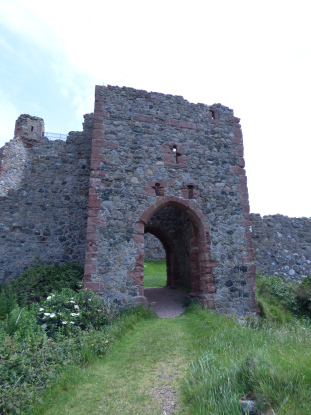An Author’s Inspiration
By Alex Marchant
I’ve
long appreciated the importance of place in my own writing – and therefore the
value of location research. My first children’s novel, Time out of Time, was set in a fictionalized version of my
childhood home – not that I grew up in a huge dilapidated house in the country,
but that old house is set within a landscape that is an amalgam of the village
on the edge of suburbia where I grew up, the local public open space (a small
river valley with the remnants of a Victorian gunpowder mill strung out along
it), and the rolling downland thereabouts. My great writing hero, Susan Cooper,
once said that she found it easier to write about the England of her youth when
she had been living in the USA for some years. Perhaps the same was true of me,
looking back to my Surrey childhood once I’d lived in Yorkshire for much of my
adult life.
‘A packhorse bridge – remnant of the nineteenth-century gunpowder
mill’
However,
being immersed in the Yorkshire countryside proved to be invaluable at the time
of writing my first historical novel, The
Order of the White Boar. The book, telling the story of the real King
Richard III for younger readers, is set largely in and around his primary home
of Middleham Castle in Wensleydale, North Yorkshire (as well as London and the
royal court at Westminster). Wandering up on the deserted moors around my home
in West Yorkshire’s ‘Bronte Country’ allowed me to step back into a somewhat
similar landscape to that around Middleham. I could easily imagine my
characters riding, hunting, hawking, picnicking (sorry – too modern a word
perhaps!) five centuries ago as I strode across the heather-, bilberry- and
bracken-clad hills and witnessed at first hand the effects of the changes of
the seasons. Readers seem to think it worked, with one reviewer saying, ‘From the minute I picked up this book, I
was transported back to Yorkshire...riding the Middleham gallops, travelling
the roads to York…’
‘Bronte Country’
I
was fortunate to live in the area while writing the book. Other locations, for
the second book in the series, The King’s
Man, which ranges further afield, had to be specially visited to gain a
proper feel for them. Some had already been on my Richard III itinerary in
previous years, but a revisit can always potentially pay dividends, reminding
of small details or atmosphere. Other places were totally new for me. For
instance, despite having plenty of ancestors who hailed from Suffolk, I’d never
set foot in the county when deciding to set the climactic scenes of the book
there. So a combined family history/location research holiday there was
arranged.
‘Gipping chapel, on the estate of Sir James Tyrell – a place
with a rumoured Ricardian connection – and next door to my ancestral village…’
I’m
so glad that decision was made. Standing in the scores (alleyways) of
Lowestoft, I could almost see and hear the final scenes play out – even feel
the sea fret closing in although it was a bright spring day. Those scenes
couldn’t have been set anywhere else.
One of the ancient ‘scores’ of Lowestoft.
I’ve
recently been undertaking location research for the third book in the series.
It’s also been a great excuse to catch up with an old friend who now lives in
the Lake District, not far from some of the places in the book – handy for
overnight stays! With the working title ‘King in Waiting’, the book covers the
couple of years immediately following the Battle of Bosworth in 1485 – a
tumultuous time of unrest and outright rebellion – as the usurper Henry Tudor
struggles to keep control of England in the face of continuing resistance from those
loyal to the House of York – and to King Richard’s memory. It’s a time of
strife often glossed over by the notion that Tudor ‘brought peace’ after the
Wars of the Roses by marrying Elizabeth of York and combining the two royal
houses. More propaganda, of course: there had been peace in England since the
Battle of Tewkesbury in 1471 – as fifteen-year-old ‘leading man’ Matthew says
in the latter part of The King’s Man,
‘What war has there been in our lifetime – until Tudor came?’ And rebellions
against Tudor continued for at least fifteen years after he took the crown.
One
of the most significant incidents during that time is the so-called Lambert
Simnel rebellion, named after its supposed figurehead, recorded by the later
official histories as being a ten-year-old imposter from Oxford. The real story
is a little more complicated and ‘King in Waiting’ explores a possible
scenario, drawn from the confusion of the earliest sources. These very much
contradict the official story, which only coalesced over several months. But
some facts we do know include the arrival of the rebel army from Dublin at a
tiny place called Piel Island in Cumbria and its remarkable march across the
spine of England to Masham in North Yorkshire in just five days. The rebels
were on foot or on horseback, probably with waggons of arms and equipment to
drag across this rugged countryside.
The mouth of Garsdale, cutting across the spine of England.
By
the miracle of modern technology (my trusty Suzuki) I did the journey spread
over three days, breaking it up into particular places I wanted to visit. The
final day I spent travelling the last leg – from Kendal, via Sedbergh, through
Garsdale to Wensleydale and Masham – all in one chunk, to experience what it
would have been like for Matthew and his companions – and, in his case, the
prospect of a return ‘home’ to Middleham on the way.
I
doubt I would ever have visited Piel Island, with its somewhat neglected
castle, if not for this research. It’s tucked away right at the end of a
southern peninsula of Cumbria and seems to have relatively few visitors. But
I’m so glad I made the trip. Seeing the place – hearing, feeling and smelling
it – sparked so many ideas for the story. Also, talking to the boatman who
ferried me across the deep channel to the castle, answered a nagging question
I’d had that couldn’t have been resolved by simply looking at a map or
photographs. Why had the rebels landed the army with all its gear on an island
off the coast if they then had to transport everything across the water again…?
‘Piel Castle and the approach to the island across
the water…’
Visiting
the places where your characters once were – for me it’s a vital part of my research.
Of course it’s a lot easier if you live in the place, or reasonably near, where
your book is set (though I’ve also popped over to Flanders for this
work-in-progress). Or, alternatively, it can offer a fantastic excuse for a
good holiday. I have the germ of an idea for a novel set in the Roman or
Byzantine period in southern Turkey … I wonder whether a fortnight would be
long enough to visit all the locations?
‘I’m not entirely sure this beach was here in the third century AD…’
Alex
Marchant
Alex Marchant was born and raised in the rolling Surrey downs,
but, following stints as an archaeologist and in publishing in London and
Gloucester, now lives surrounded by moors in King Richard III’s northern
heartland, not far from his beloved York and Middleham.
A Ricardian and writer since a teenager, Alex’s first novel, Time out of Time, won the 2012 Chapter
One Children’s Book Award, but was then put on the backburner in 2013 at the
announcement of the rediscovery of King Richard’s grave in a car park in
Leicester. Discovering that there were no books for children telling the story
of the real Richard III, Alex was inspired to write them, and so The Order of the White Boar and its
sequel, The King’s Man, were born.
Together they tell King Richard’s story through the eyes of a young page who
enters his service in the summer of 1482, and have been called ‘a wonderful
work of historical fiction for both children and adults’ by the Bulletin of the Richard III Society.
As well as writing the third book in the White Boar series and reworking Time
out of Time for publication, Alex is currently preparing for publication Right Trusty and Well Beloved…, a
follow-up to Grant Me the Carving of My
Name, the anthology of Richard III-inspired short stories sold in support
of Scoliosis Association UK (SAUK). Right
Trusty… will be published on 1 November 2019.
All
the books are (or will be) available
through Amazon at
Connect with Alex: Blog • Facebook • Twitter • GoodReads.











No comments:
Post a Comment
See you on your next coffee break!
Take Care,
Mary Anne xxx